

Ancient Greek Mercenaries in Antiquity. Late Bronze Age Mycaenean Warrior armed with axine.

Courtesy Living Hisrory Association “KORYVANTES“ The mercenaries appear in the 7th century Lyric Poetry, in the works of Alcaeus and Archilochus. At this period the phalanx tactics had matured in the Greek armies. The spearman was not a static unit simply enduring the enemy missiles just protecting his own missile-using colleagues but advanced vigorously in order to crash the enemy and was also brought o Asia by the Greek colonists.
The fame of this peculiar for its time infantry reached as far as Babylon. The Assyrian army neutralized its opponent with a mighty chariot charge against enemies who had first been “softened up” by Assyrian missile troops. Ancient Greek Mercenaries in Antiquity. The word mercenary (misthophoros in Greek) initially meant someone paid with a salary and that included hired labor.

But quite early it started describing the professional fighter who did not fought in defense of his clan or his city-state but risked his life for pay or other reward. The usage of professional warriors from the Bronze Age can be safely assumed as the complete retails of the organization and structure of the period armies are not quite clear to us. Ten Thousand (Greek mercenaries) The "ten thousand" were in the middle of a very large empire with no food, no employer, and no reliable friends.
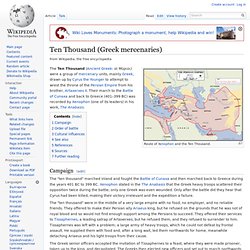
They offered to make their Persian ally Ariaeus king, but he refused on the grounds that he was not of royal blood and so would not find enough support among the Persians to succeed. They offered their services to Tissaphernes, a leading satrap of Artaxerxes, but he refused them, and they refused to surrender to him. Tissaphernes was left with a problem; a large army of heavy troops, which he could not defeat by frontal assault.
He supplied them with food and, after a long wait, led them northwards for home, meanwhile detaching Ariaeus and his light troops from their cause. The Greek senior officers accepted the invitation of Tissaphernes to a feast, where they were made prisoner, taken up to the king, and decapitated. According to Xenophon, the Ten Thousand were composed of: Jump up ^ Xenophon (1904 (repr. 1961)). Agesilaos II. Alexon. Archilochos. Archilochos (griechisch Ἀρχίλοχος; * um 680 v.
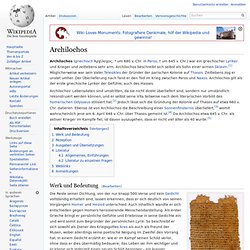
Chr. in Paros; † um 645 v. Chr.) war ein griechischer Lyriker und Krieger und zeitlebens sehr arm. Archilochos beschreibt sich selbst als Sohn einer armen Sklavin.[1] Möglicherweise war sein Vater Telesikles der Gründer der parischen Kolonie auf Thasos. Zeitlebens zog er unstet umher. Der Überlieferung nach fand er den Tod im Krieg zwischen Paros und Naxos. Charidemus. Charidemus (in Greek Χαρίδημος), of Oreus in Euboea, was a Greek mercenary leader of the 4th century BC.
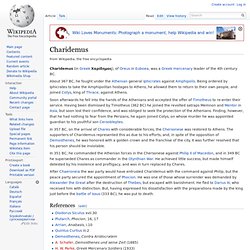
In 357 BC, on the arrival of Chares with considerable forces, the Chersonese was restored to Athens. The supporters of Charidemus represented this as due to his efforts, and, in spite of the opposition of Demosthenes, he was honored with a golden crown and the franchise of the city. It was further resolved that his person should be inviolable. Clearchus of Sparta. Clearchus or Clearch (Ancient Greek: Κλέαρχος), the son of Rhamphias, was a Spartan general and mercenary.
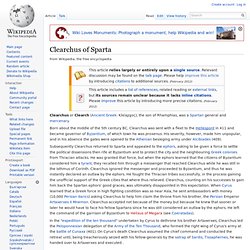
Born about the middle of the 5th century BC, Clearchus was sent with a fleet to the Hellespont in 411 and became governor of Byzantium, of which town he was proxenus. His severity, however, made him unpopular, and in his absence the gates were opened to the Athenian besieging army under Alcibiades (409). Subsequently Clearchus returned to Sparta and appealed to the ephors, asking to be given a force to settle the political dissensions then rife at Byzantium and to protect the city and the neighbouring Greek colonies from Thracian attacks. He was granted that force, but when the ephors learned that the citizens of Byzantium considered him a tyrant, they recalled him through a messenger that reached Clearchus while he was still in the Isthmus of Corinth. Clearchus ignored the messenger and proceeded to Byzantium, and thus he was instantly declared an outlaw by the ephors. Iphikrates. Iphikrates (* 415 v.

Chr.; † um 353 v. Chr.) war ein athenischer Feldherr in der ersten Hälfte des 4. Memnon of Rhodes. Memnon of Rhodes (380 – 333 BC) was the commander of the Greek mercenaries in the service of the Persian king Darius III when Alexander the Great of Macedonia invaded Persia in 334 BC.
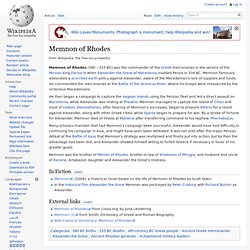
Memnon famously advocated a scorched earth policy against Alexander, aware of the Macedonian's lack of supplies and funds. He commanded the mercenaries at the Battle of the Granicus River, where his troops were massacred by the victorious Macedonians. He then began a campaign to capture the Aegean islands using the Persian fleet and led a direct assault on Macedonia, while Alexander was resting at Phaselis.
Memnon managed to capture the island of Chios and most of Lesbos. Memnon von Rhodos. Dennoch wurde die Verteidigung der Stadt nach einer mehrmonatigen Belagerung überwunden.

Memnon musste die Stadt preisgeben und sich auf die Hafeninsel und eine vorgelagerte Burg zurückziehen. Vor dem Rückzug ließ er alle Stadtviertel und Waffenmagazine nahe der Stadtmauer in Brand stecken. Das Mausoleum entging den Flammen. Dareios III. übertrug Memnon den Oberbefehl über die persische Flotte in der Ägäis. Da diese durch Alexanders Taktik, vor allem die Hafenstädte zu besetzen, weitgehend von der ionischen Küste verdrängt war, versuchte Memnon, die Makedonen von Europa abzuschneiden und in Griechenland die von Sparta betriebene Erhebung gegen Alexander in Gang zu bringen.
Literatur[Bearbeiten] Memnon. Memnon of Rhodes (c.380-333): Greek mercenary leader in Persian service, adversary of Alexander the Great.
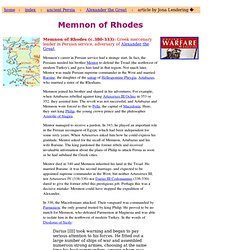
Memnon's career in Persian service had a strange start. Phalaikos. Proxenus of Boeotia. Proxenus of Boeotia was a disciple of Gorgias, and a friend of Xenophon. Being connected by the ties of hospitality with the Cyrus the younger, the latter engaged him in his service. He came to Sardes at the head of 1500 heavy armed, and 500 light armed soldiers, (Xen. Anab. i. 1. § 11, 2. § 3.) It was at his invitation that Xenophon was induced to enter the service of Cyrus (iii. 1. §§ 4, 8). He was one of the four ill-fated generals whom Clearchus of Sparta persuaded to accompany him to Tissaphernes. Pythagoras the Spartan. Pythagoras is stated as Lacedaemonian, it is however not known if he is directly from Sparta.
Mentor of Rhodes. Mentor of Rhodes. In 358 BC, Mentor, along with his brother Memnon, were hired to provide military leadership by a rebel Persian satrap, Artabazus. Despite Mentor's capable leadership, the rebellion failed, and Artabazus, Barsine and Memnon fled to Macedon, where they were welcomed by Philip II. Mentor fled to Egypt. Xanthippus of Carthage. Xanthippus (Gr. Ξάνθιππος) was a Spartan mercenary general hired by the Carthaginians to aid in their war against the Romans during the First Punic War. He trained Carthaginian soldiers and led them into the battle of Tunis, where Carthaginian forces routed the Roman expeditionary force and captured the Roman consul Marcus Atilius Regulus in 255 BC. Xanthippus is credited with the Carthaginian formation, cavalry split between the two wings, mercenary infantry on their right, with a hastily raised phalanx of civilians in the centre and a line of elephants in front of the infantry, which defeated the Romans formed in their normal formation, with the outnumbered cavalry on the wings and legionary infantry in the centre.
Xenias of Arcadia. For other persons with the same name, see Xenias See also[edit] References[edit] Xenophon. Xenophon (griechisch Ξενοφῶν; * zwischen 430 und 425 v.